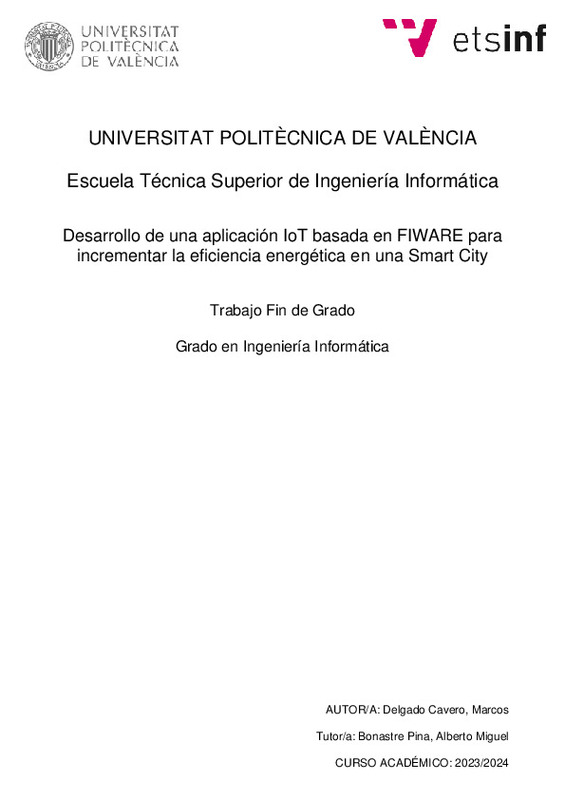|
Resumen:
|
[ES] En la actualidad, cada vez son más las ciudades que deciden dar el paso para convertirse
en Smart Cities debido a las ventajas que conlleva esta transformación.
El avance de las tecnologías a lo largo de los años ...[+]
[ES] En la actualidad, cada vez son más las ciudades que deciden dar el paso para convertirse
en Smart Cities debido a las ventajas que conlleva esta transformación.
El avance de las tecnologías a lo largo de los años permite un gran abanico de
posibilidades a la hora de conectar los recursos disponibles, y así sacar el máximo partido a
los sistemas basados en dispositivos electrónicos que nos rodean y que usamos
continuamente en nuestra vida cotidiana.
Una de las aplicaciones más llamativas de este nuevo contexto tecnológico son las
Ciudades Inteligentes (Smart Cities). Consisten en aplicar tecnologías como las redes de
sensores, Internet de las Cosas (Internet of Things o IoT), Computación y almacenamiento
en la nube (Cloud Computing) y Algoritmos de tratamientos de información (Data Science,
Inteligencia Ambiental, Inteligencia Artificial) a la gestión pública municipal de espacios
urbanos.
Para proporcionar la necesaria integración de todos estos servicios es necesario disponer
de las denominadas plataformas de IoT, que soportan la colaboración entre las diferentes
tecnologías involucradas, así como la interconexión con otras plataformas y bases de datos
abiertas. Como ejemplo de aplicación de estas plataformas IoT, en este proyecto hemos
empleado la plataforma Fiware, software de código abierto impulsado por la Unión Europea,
con implantación en muchas de las grandes Smart Cities europeas.
En este proyecto utilizaremos la plataforma FIWARE para la implementación de una
aplicación Smart City en colaboración con el ayuntamiento de Vilamarxant. Como parte de
un futuro sistema integral gestión municipal, en este trabajo nos centraremos en las
herramientas que permiten administrar de la forma más eficiente posible el consumo de
energía en las dependencias municipales, sin desatender la comodidad de los usuarios, a la
par que se garantiza el cumplimiento de los estándares de calidad exigibles.
[-]
[EN] Nowadays the number of cities that decide to take the step to become Smart Cities is
increasing due to the advantages that this transformation brings.
The advance of technologies over the years allows a wide range ...[+]
[EN] Nowadays the number of cities that decide to take the step to become Smart Cities is
increasing due to the advantages that this transformation brings.
The advance of technologies over the years allows a wide range of possibilities when it
comes to connecting available resources, and thus making the most of the systems based on
electronic devices that surround us and that we use continuously in our daily lives.
One of the most striking applications of this new technological context is Smart Cities.
They consist of applying technologies such as sensor networks, Internet of Things (Internet
of Things or IoT), cloud computing and storage (Cloud Computing) and information
processing algorithms (Data Science, Ambient Intelligence, Artificial Intelligence) to
municipal public management of urban spaces.
To provide the necessary integration of all these services it is necessary to have the socalled IoT platforms, which support collaboration between the different technologies
involved, as well as interconnection with other platforms and open databases. As an example
of the application of these IoT platforms, in this project we have used the Fiware platform,
open-source software promoted by the European Union, with implementation in many of the
large European Smart Cities.
In this project we will use the FIWARE platform for the implementation of a Smart City
application in collaboration with Vilamarxant town council. As part of a future integral
municipal management system, in this work we will focus on the tools that allow the most
efficient possible management of energy consumption in municipal buildings, without
neglecting the comfort of users, while ensuring compliance with the required quality
standards.
[-]
|







